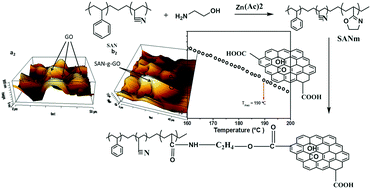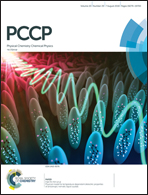Phase miscibility and dynamic heterogeneity in PMMA/SAN blends through solvent free reactive grafting of SAN on graphene oxide
Abstract
The spatial distribution of nanoparticles in a particular host polymer matrix can be improved by using brush coated nanoparticles. In this work we have grafted styrene-acrylonitrile (SAN) onto the surface of graphene oxide (GO) and investigated as to how the demixing temperature, morphology and volume cooperativity of PMMA/SAN blends are influenced. Grafting of polymer chains on the surface of nanoparticles usually involves the use of large amounts of solvents, many which are detrimental to the environment besides involving cumbersome processes. SAN-g-GO was prepared by a robust solvent-free strategy wherein the cyano group in SAN was replaced by oxazoline groups during melt mixing in the presence of zinc acetate and ethanol amine. These newly created oxazoline groups reacted with the COOH group of GO under melt extrusion resulting in grafting of SAN on the surface of GO sheets. The effect of SAN-g-GO nanoparticles on the demixing, local segmental motions and morphology evolution for different annealing times was carefully investigated in a classical LCST system, PMMA/SAN blend, using melt rheology, modulated DSC and AFM, respectively. The changes in viscoelastic behavior in the vicinity of demixing are investigated systematically for the control, and blends with GO and SAN-g-GO. Various models were used to gain insight into the spinodal decomposition temperatures of the blends. Interestingly, the demixing temperature determined rheologically and the spinodal decomposition temperature increased significantly in the presence of polymer grafted nanoparticles in comparison to the control and blends with GO. The evolution of the morphology, interfacial driven coarsening as a function of temperature and the localization of nanoparticles were assessed using atomic force microscopy. The cooperatively re-arranging regions estimated from calorimetric measurements begin to suggest enhanced dynamic heterogeneity in the presence of GO and SAN-g-GO in the blends. Taken together, our study reveals that the solvent-free approach of grafting SAN onto GO delays demixing, suppresses coalescence and alters cooperative relaxation in PMMA/SAN blends.



 Please wait while we load your content...
Please wait while we load your content...